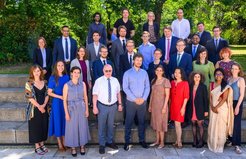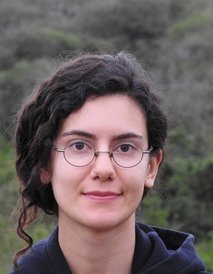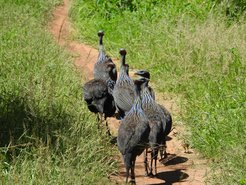Danai Papageorgiou wins the Otto Hanh medal
Doctoral student is honored for research uncovering the complex social life of the vulturine guineafowl


Early in her doctoral degree, Danai Papageorgiou attended a conference for National Geographic Explorers where she heard a piece of career advice from a female senior scientist: work hard and be kind.
That advice would stay with her as she continued her doctoral research with the Max Planck Institute of Animal Behavior (MPI-AB), under the supervision of Damien Farine, on the social behavior of a previously unstudied African bird, the vulturine guineafowl. The advice coursed through the 15 months of field work in Kenya, where she collaborated with Kenyan scientists at Mpala Research Centre, often under the looming threat of angry elephants, tagging birds with GPS trackers to collect the first-ever data on movement and social behavior of the species.
Ultimately, it paid dividends. After submitting her thesis “Collective movement and social decision-making in the Vulturine Guineafowl” Papageorgiou won the Otto Hahn Medal 2022 in recognition of her outstanding doctoral work. She received the award at a ceremony in Berlin on June 22, 2022.
The medal, awarded by the Max Planck Society, honours up to 30 young scientists and researchers each year for outstanding achievements from the initial creative period of young scientists. The Otto Hahn Medal 2022 was awarded to 29 young early career researchers with 7,500 euros prize money. The prize is intended to motivate especially gifted junior scientists and researchers to pursue a future university or research career.
As a junior scientist forging her career, Papageorgiou acknowledges the impact of the award on her CV. “It’s recognition of the hard work that goes into every doctoral degree and the support of my supervisor and many colleagues who have helped me along the way,” she says.
Lessons from a peculiar bird
Papageorgiou is fascinated by the mysteries of how animal societies are organized and make decisions. As ultra-social humans, it’s easy for us to relate: we spend our lives surrounded by others—from close family and friends to more distant colleagues or strangers. And we change our behavior according to these relationships.
“Social non-human animals are also connected with others of their species and occasionally have to solve organizational and coordination challenges that emerge in their societies,” she says. “But how do they decide where to go and what to do, while sticking together as a stable group?”
To answer this question, Papageorgiou studied a peculiar bird native to Africa, the vulturine guineafowl. Although unstudied at the time, the birds had traits that made them ideal for studying sociality: “They move in cohesive groups mostly on the ground, and they are large enough to comfortably carry GPS trackers,” she said.
Together with her supervisor Damien Farine, who at the time was a group leader at the MPI-AB, Papageorgiou established a long-term study of the system at the Mpala Research Centre in Kenya. Over three years, the researchers tagged birds in multiple groups with leg bands and GPS trackers, which allowed them to identify individuals and track their movements in high resolution.

“Although it was a huge amount of work to set up, from scratch, a long-term study system, it ultimately allowed me to look into how groups make decisions and to link this to group characteristics and environmental parameters,” she says.
The result was an intimate portrait of an animal society—from how the group is structured, to how they decide or resolve conflicts, to how the complexities of the environment shape their behavior. The project produced a ground-breaking discovery of the first multilevel society in birds. These complex societies were only thought to exist in mammals, but Papageorgiou and Farine showed that vulturine guineafowl form stable groups that interact preferentially with specific other groups—suggesting that birds can keep track of social associations with hundreds of individuals.
The next three years
Another intriguing result from her thesis was that groups managed to maintain the balance of power. For example, when dominant birds monopolised a particularly rich food patch—chasing other group members out—then the excluded subordinates joined forces to move the group away from the patch, ultimately forcing the dominants to abandon their rich resources.
For Papageorgiou, this was fascinating evidence of how collectives can mitigate rising social inequality. “Just like humans, animals living in groups also experience inequality, with dominant individuals monopolizing access to resources,” she says. “But like in our societies, social dynamics operate inside these animal groups and control the distribution of resources among group members.”
A six-month fellowship at the Wissenschaftskolleg zu Berlin will give Papageorgiou the intellectual freedom and financial support to explore this further. “I will study behavioral processes that impose checks on inequality and that may be operating across many non-human animal societies and to develop a theoretical framework on how to study and categorize those processes in the wild,” she says.
After that, she will relocate to the University of Bristol to begin a Marie Curie-funded post-doctoral fellowship on bottlenose dolphins in Shark Bay, Australia. Her project seeks to understand if synchronous behavior in males—both acoustic and motor—leads to improved reproductive success.
With the next three years secured, Papageorgiou is looking forward to a well-earned break. “I’ve spent the last five years going full steam, from finishing my degree to making sure I have a job afterwards, so now I am going to distance myself from research for a couple of months to then start again fully motivated.”














